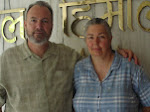WILDERNESS TRUTHS FOR MODERN TIMES-51
TEXT:
"And they came unto the brook of Eshcol, and cut down from thence a branch with one cluster of grapes, and they bare it between two upon a staff; and they brought of the pomegranates, and of the figs." (Numbers 12:23)
I. CONTRASTS
A. In our wiling walk with Him we will learn and receive of Him. But we must stay with Him. He may lead in various and unlikely situations of great contrast. This will be necessary for learning and receiving.
B. A great contrast is seen in Numbers 13:23. The 12 men leave the wilderness and go into a land which flows with milk and honey. From the wilderness to abundance could be a pleasant contrast for all. From nothing to abundance would certainly magnify the blessing of plenty.
C. God wants to illustrate to us light, He can take us into darkness, and then into light. That would make an impression upon us. If He wants to put joy into our soul, He could take us through sorrow, and then plunge us into joy.
D. God will bring us through great contrast in order to emphasize certain qualities, and establish them in us. If we are taken from joy into greater joy, that second joy will not be too much emphasized. But if we are brought from sorrow into greater joy, it becomes greatly impressed
upon our life.
E. Often He will reverse the contrast. If He wants to impress upon us a degree of the sorrow His Son experienced, He will bring us into great joy, then plunge us into sorrow. That way, we shall not only learn about the Man of Sorrows, we shall experience some of His sorrow. It will change us. It will equip us to comfort those who sorrow.
F. The contrast of light with darkness will teach us many things and enrich our spiritual life.
G. As we walk with the Lord His presence will be so near and intense that we may not be able to eat nor sleep on a regular schedule. We love the light. But after several weeks, maybe months that wonderful climate will lift and we will find ourselves in total darkness and dryness.
H. We then are impressed, terrified, amazed, puzzled. We are learning darkness and drought. We are learning those things which can be learned only in a wilderness. We are learning that God is faithful to us, even in a desert land, and He could be our light, even in darkness.
I. As always with the Lord, there is a deeper lesson He desires to teach us as we are faithful to Him. During this time in the wilderness He desires to give us the treasures contained in the darkness.
"By night on my bed I sought him whom my soul loveth: I sought him, but I found him not. I will rise now, and go about the city in the streets, and in the broad ways I will seek him whom my soul loveth: I sought him, but I found him not." (Song 3:1-2)
Those treasures contained in the unknown, silent and still, moving in a direction we do not know ones that will build a foundation of total trust in us that no matter what we face, we will not be moved. Those that will develop a love relationship with Him.
II. PARTING THOUGHTS
A. There are two areas of blessing which relate to the wilderness. One concerns the blessings that are within the wilderness; the other the opportunity for blessings based upon the wilderness itself and our proper responses. The Promised Land was the opportunity for blessings based upon how the children of Israel responded to God in the wilderness.
B. There is no way the Israelites could get from Egypt to Canaan without going through the many wildernesses. After the wilderness, a dip into the land of milk and honey revealed the blessings.
C. But, before the blessings come, before the land of milk
and honey, before we inter into the joys of the Lord we must walk in the footsteps of obedience and faithfulness to the Lord.
"His lord said unto him, Well done, thou good and faithful servant: thou hast been faithful over a few things, I will make thee ruler over many things: enter thou into the joy of thy lord." (Matthew 25:21)
D. In the wilderness all too often our vision is sorely limited. We see the lack and the difficulties. God's provisions cannot be seen very clearly if at all. Many believers do not know that God can provide a table for the needy even in the wilderness.
E. The provisions and power of God do not determine whether we fail or succeed in our walk with God. His provisions and power are always at hand and without limit. The ability of God to work in and through us is not the determining factor in our failure or success. God is more than able always.

